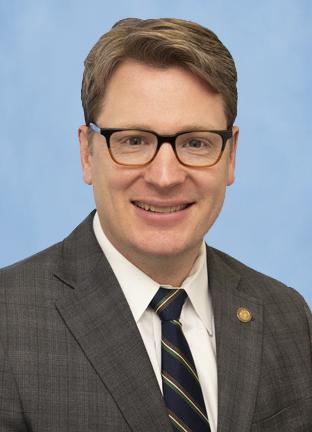Remarks from the June 5th, 2020 Michigan Medicine town hall discussing the impact of structural racism on our community.
One year ago, we came together for a town hall, much as we have recently, to discuss a reprehensible act of racism and hate right in our workplace. I attended. During the open mic part of the session, a faculty member, who I now know to be, Dr. Christina Chapman, shared: "As a black woman, the hardest thing about these recurring acts of racial violence is that I sit at home and cry, and then come to work and everyone is acting like nothing happened."
Listening to this I felt intense shame. I was complicit in this. At that moment, I understood what it means to have privilege, as a white man, to watch the news, and then set these horrors aside to go about my work productively.
Now when I see these events unfold, I immediately think about her story. While we are all watching these events, and many of us are outraged, the burden does not fall equally. Not all of us fear for our own lives, or those of our parents, siblings, or children.
On a department town hall this past Monday, Glenn Wakam, one of our 5th year general surgery residents, a graduate of Princeton and UCSF medical school, told us that when he is sitting on his couch in a shorts and a hoodie, and decides he wants ice cream, he has to go change his clothes before going out. Because of fear. In my 5 decades of life, I have never once had this thought.
To quote one of our 2nd year general surgery residents, Sidra Bonner, "racism is a system not an event."
We hold these types of events, like this town hall, as a response. I have learned from Sidra, and Glenn, and others, that you cannot fight a system with events…you need a counter-system. A set of policies, procedures, and a culture that truly supports inclusion. That means action. This type of intentional countermeasure is what we need to build here at Michigan Medicine.
What does that mean? That means intentionally deconstructing and reconstructing every process, policy, and procedure according to antiracist principles and the notion of being an ally, and an accomplice.
If you do not know what antiracist, ally, or accomplice means, then you, like me, need to learn. I have heard very clearly from the black and minority residents in my department, and around the country, that you should not ask them to educate you; not until you have at least read and studied widely, as they have.
We are working hard in the Department of Surgery to begin to educate ourselves. We are doing this because we believe that diversity drives excellence and also that we need to take responsibility for our role in moving the culture of American surgery from one of hierarchy and exclusion to one of inclusion.
We began by asking ourselves some tough questions.
We asked ourselves: do we have equitable recruitment of residents, faculty, and staff? We found ourselves lacking. We therefore formed a representative, diverse department recruitment committee that deploys best practices in cultivating a diverse applicant pool, trains members in implicit and explicit bias, and uses objective evaluations.
But we need to do more.
We asked ourselves: do we regularly have a forum to discuss bias and racism? We found ourselves lacking. So we launched a cultural complications conference to discuss cases of behavior that do not live up to our desired standards.
But we need to do more.
We asked ourselves: do we ensure equal access to mentorship and sponsorship? We found ourselves lacking. So we implemented launch teams for residents, junior faculty, and boost teams for mid-career faculty.
But we need to do more.
We asked ourselves: do we pay attention to the visual messages in our spaces? We found ourselves lacking. Our walls speak loudly, and they often say: you do not belong here. We began creating new imagery that reflects and showcases all aspects of diversity in our department.
But we need to do much more.
These initiatives collectively we call the Michigan Promise. The promise is that if you come here, to Michigan, no matter what you look like, or what your interests, we will ensure that you fulfill your potential.
I do have some hope that the little work we have done, this beginning of a journey, is working. This year we have as many black women as we do white men in our incoming class of general surgery interns.
While I am hopeful, I also am afraid. I am afraid that I will fail to provide these interns the supportive environment they deserve. I am afraid I will not fulfill my promise. This Michigan Promise.
For all the leaders in this organization, most of whom look just like me, if you ask yourselves these questions above, would you find yourselves lacking, as we have?
If so, let us take action together. Let us build a future together where we can all keep our promises.
Thank you.
Justin B. Dimick, MD, MPH
Department of Surgery Chair
Frederick A. Coller Distinguished Professor of Surgery

